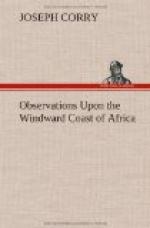During my stay on this river, I visited the whole of these branches, and in addition to personal investigation, I obtained much information from the various conductors of these factories, and had a variety of opportunities of communicating with many of the natives from the interior countries, who are drawn hither by the extensive commerce of the Rio Pongo. In my excursions on this river, I was generally accompanied by Captain William Browne, of Liverpool, who was part owner of the Minerva, and had the sole management of the concerns of her voyage; and I am happy to give him this public testimony of the many obligations he conferred upon me, while on this part of the coast, which unceasingly continued until my arrival in England, by the way of the West Indies.
The countries bounded by the Rio Pongo and the Gambia, are inhabited by the Nilloes and various tribes, who carry on a considerable trade with that river, the Rio Noonez, and Rio Grande, and inland to the two latter, is the powerful nation of the Foolahs, possessing an extensive country, about 200 miles in breadth from north to south, and 400 miles from east to west. Teembo, the capital of the Foolah king, is about 270 miles inland from the entrance of the Rio Noonez. The paths for trade and communication with the interior, from this position, are at the king’s pleasure, and he opens and shuts them by his mandate. The Foolahs are tall, well-limbed, robust and courageous, grave in their deportment, are well acquainted with commerce, and travel over an astonishing space of the country. Their religion is a mixture of Mahomedanism, idolatry, and fetishism. One of their tenets, which inculcates the destruction of those they term infidels, is peculiarly friendly to slavery, and as the greater part of their neighbouring tribes are of that description, they are continually practising every violence, and, are frequently engaged in wars. When I suggested to a chief of very considerable intelligence, and one of the Foolah king’s head men, whom I met in the Rio Pongo, the enormity of their injustice to the surrounding tribes, and how displeasing it was to the God they prayed to, his reply was, “True, this be bad fashion to Foolah, or Mandingo man, but these people we make war against never pray to God, nor do we make war with those who give God Almighty service.” While this barbarism exists, and the slave trade is continued, humanity will have to, bewail the miserable condition of the African slave. For this, and various other reasons that might be urged, and considering the position and extensive influence of the Foolah nation, their king claims a high consideration in a combined scheme of establishment upon the coast.
So impressed was this chief, of the beneficial advantages to be derived from agriculture, that he tendered land, cattle, men, &c. to the agents of the Sierra Leone Company, only requesting from them, in return, a delegated superintendance; but, strange to tell, this disposition was not cultivated nor improved; nor was the further offer of the king of Laby, and his high priest, to place their sons under the protection of the Company, to be sent to England and educated. A more important step could not have been taken to attain the object of the Directors, than this of attaching the Foolah nation to their interest.




